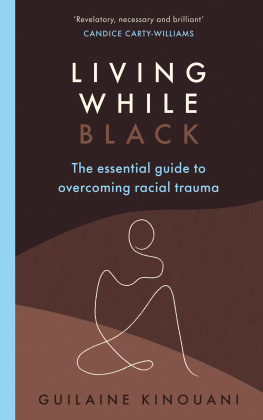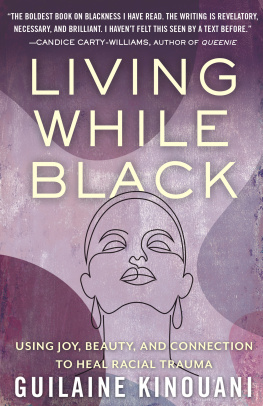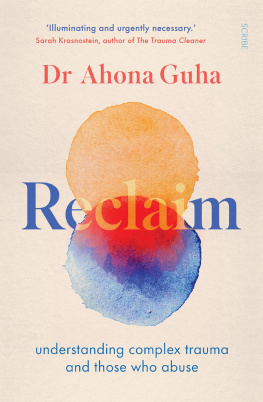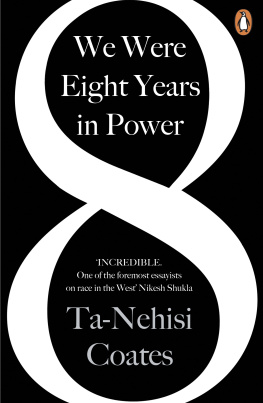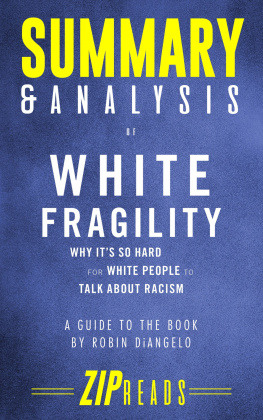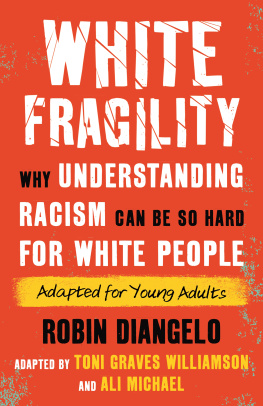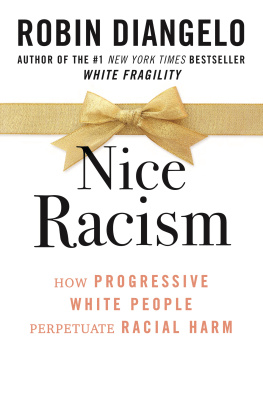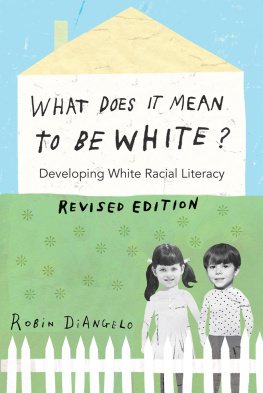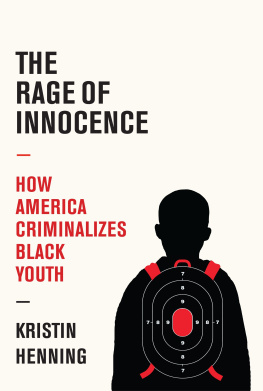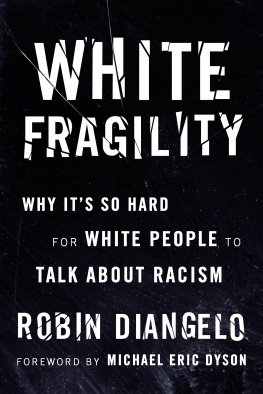
WRITE-ON PAGES
Any references to writing in this book refer to the original printed version.
Readers should write on a separate piece of paper in these instances.
To Misbah, Hayan, Yael and Malia
To Maman, Papa and Papa
To the gang of eight
To the ancestors
To us.
Guilaine Kinouani
LIVING WHILE BLACK
The Essential Guide to Overcoming Racial Trauma

EBURY
UK | USA | Canada | Ireland | Australia
New Zealand | India | South Africa
Ebury is part of the Penguin Random House group of companies whose addresses can be found at global.penguinrandomhouse.com.

First published by Ebury Press in 2021
Copyright Guilaine Kinouani 2021
The moral right of the author has been asserted
Cover design: Loulou Clark
ISBN: 978-1-473-59088-5
This ebook is copyright material and must not be copied, reproduced, transferred, distributed, leased, licensed or publicly performed or used in any way except as specifically permitted in writing by the publishers, as allowed under the terms and conditions under which it was purchased or as strictly permitted by applicable copyright law. Any unauthorized distribution or use of this text may be a direct infringement of the authors and publishers rights and those responsible may be liable in law accordingly.
Disclaimer: the events described in this book are based on the experiences of the author. The anecdotes described are not based on any one specific individual but rather a selection of composite characters drawing on the various experiences of the author. Although occasionally a character has been given a name, this is for narrative flow rather than because it represents just one person. Any similarities are purely coincidental. This is because this is not a book about any one individual but about what we can learn from them and how they shape our approach as readers to each other. This book does not substitute medical or therapeutic attention. If you are suffering from psychological distress, mental health or medical issues, consider speaking to your appointed doctor or mental health practitioner and follow their advice.
Introduction
Racism causes harm.
Harm to the body. And harm to the mind. Yet it is only in November 2020 that the American Medical Association recognised racism as an urgent threat to public health. Thankfully, many of us did not wait for this penny to drop to tackle its impact. For about 15 years I have been working therapeutically with people of colour, supporting almost exclusively Black people distressed by racism and experiencing racial trauma. Living While Black seeks to offer the same support in book form, by presenting some of this work the politics, personal and professional experiences that underlie my psychology and psychotherapy practice to help us find connection, hope and empowerment.
Before we begin, I want to tell you a little bit about the journey to bringing this book to life. I have carved my practice out of the whiteness of psychology and of psychotherapy. I have carved it out of the thousands of micro and macro experiences of discrimination and Othering I had to navigate. I have refused to ignore this rich data, the intellectual gifts contained therein and its potential to help others heal. Exploring and reflecting on my own lived experience, my lived evidence, has been central to understanding patterns of harm and domination, but also patterns of resistance. My scholarship was born out of the documentation of these patterns on Race Reflections, a platform that started as a blog and turned into a social enterprise dedicated to tackling inequality, injustice and oppression. Women especially Black women are socialised to distrust what we know and to be suspicious of our own authority. Oftentimes, we stop ourselves from using our gifts or we wait for someone to give us the go-ahead or to tell us how to start. And when to start. I had little support when I decided to set up my practice. What drove me was simply a strong will or perhaps a strong need to have a space where as a Black woman, a mental health professional and psychologist, I could engage with both subjects from the vantage point of being a Black female body in the world, with the richness, complexities and baggage that this entails.
Distilling these complex learnings, the primary aim of Living While Black is to make many of us who often havent felt this way feel heard, seen and held. The book seeks to help Black people to thrive by first confronting the nuances of Blackness, then creating a tailored self-care plan. The first aspect is achieved via case studies, research and strategies borne out of countless hours of clinical practice and personal reflections, some of it extracted from the work of Race Reflections. The second aspect guides the reader as they self-reflect and prompts them to engage in self-care activities. Living While Black is a vital psychology guide for Black people. It is also an anti-racist text for others who simply want to better understand the effects of anti-Black racism so they can do better. It is also a resource for mental health, social care and medical practitioners working with Black people.
The book sheds a light on the trauma of racism its impact on both our mental and physical health and its consequences across individuals lifespans, across generations and across social contexts. It exposes anti-Black experiences, which society tells us are not occurring or, if they are, are not causing us harm. I want there to be no doubt that racism harms and that racial trauma is real. But equally, I want to show that it is possible to resist and to practise radical self-care while navigating white supremacy.
The material you will encounter in the book does not reach most psychology and psychotherapy teaching or our collective consciousness. In fact, it is material we have learnt to censor. It is therefore rich and heavy material that you are asked to engage with and to honour. Here, you will encounter intersectional violence, intergenerational wounds, normalised trauma, everyday resistance, cultural homelessness and structural inequality and all the intersections of the socio-economic, the political, the historical, the institutional, the relational and the psychological. This is the stuff that tends not to reach Black people who seek support for psychological distress. Many mental health professionals still believe politics belong outside of our therapy rooms. That therapy is not political. The whiteness of this position is still to be accepted as a fact, let alone as a problem. Way too many mental health professionals consider social structures and indeed racism to be a distraction from the real issues or a vehicle to the real issues. And for way too many psychotherapists and psychologists the real issues still lie in our relationship with our mother (imagine a slave in distress at their condition, being asked to reflect on their relationship with their mother, to get to the real issues).
Over the years, Black people have come to my practice after having been further harmed by those whose job it is to facilitate healing. Psychotherapy and mental health services continue to struggle to work with racism; in fact it often reproduces it. Mindlessly. The reality is this: if you are Black and those you seek support from are unwilling to look at racism and the trauma it inflicts, these individuals or systems are simply unwilling to look you in the eye. They do not want to see you. They are not prepared to engage with the weight and complexities of our shared and often bloodied history. From there, there is usually nowhere to go but an impasse. A wall. The wall of whiteness. It is this absence that creates the gap that continues to make racism near impossible to address in therapy for way too many.
Next page
